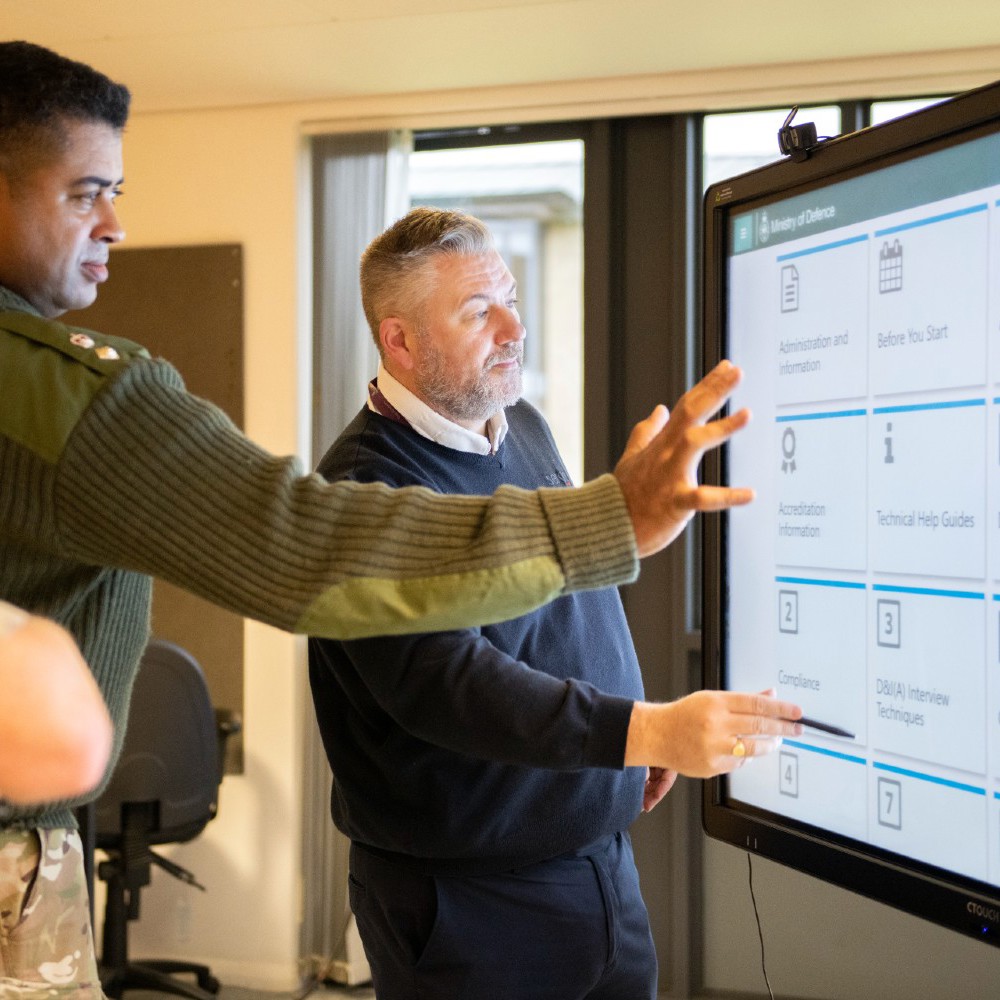Course Information
About this course
This course is delivered by the Defence Centre for Training Support (DCTS) and covers the key principles of external validation (ExVal) in addition to an understanding of each of the four elements of Defence Systems Approach to Training (DSAT).
A useful course if you work within a Training Requirement Authority (TRA) (normally within an ExVal team) and your primary role is to devise an ExVal strategy, collect and analyse ExVal data, and present ExVal findings to determine how well training prepares people for their jobs.
Please note: all our courses will be open for application 6 months prior to the course start date and will appear in the 'Planned dates' box when we are accepting applications. Once application capacity for a singular course iteration has been reached, these course dates will be removed from the 'Planned dates' box. In the table below you can see all course iterations for the full training year and when they will become open for application. For further information please refer to 2025DIN07-019-Defence Centre for Training Support (DCTS) course information and instruction, which can be found on MODNET.
Applications for the course will be closed six weeks prior to the start date.
| Course number | Course dates | Open for application from |
|---|---|---|
|
EV 001 |
23 – 24 Apr 26 |
Jan 26 |
|
EV 002 |
21 – 22 May 26 |
Jan 26 |
|
EV 003 |
25 – 26 Jun 26 |
Jan 26 |
|
EV 004 |
17 – 18 Sep 26 |
Apr 26 |
|
EV 005 |
10 – 11 Dec 26 |
Jul 26 |
|
EV 006 |
04 – 05 Feb 27 |
Sep 26 |
What you will learn
You will learn to:
- measure changes in the behaviour of individuals as a result of a training activity
- measure how well the enhancement of knowledge/skills/attitudes (KSA) has prepared individuals for their role
- measure the contribution of training to the achievement of operational and/or business goals
- develop an ExVal strategy that describes when and how to collect data
- develop ExVal data collection instruments that are valid and reliable
- collect ExVal data from a variety of sources
- analyse qualitative and quantitative ExVal data
- present ExVal document in an auditable way analyses, decisions and recommendations (normally in an ExVal report)
How this course will help your career
If you are posted into an ExVal appointment in the area of defence training, whether it be as a member of the military, a civil servant or a contractor and you require an understanding of DSAT. An awareness of DSAT will allow you, as an ExVal analyst, to deliver effective efficient, safe and well designed training.
Entry requirements
Who can attend this course
- Military
- MOD civil servants
- Partners across government (PAG)
- Industry
- Internationals
Restricted to personnel involved in ExVal roles that require an understanding of DSAT.
DCTS priority matrix applicants are to use the priority matrix below to identify where they best fall as a priority for the course. On receipt of application acknowledgement and student justification form from DCTS, all applicants are to list their priority number and return the student justification detailing why they fall within the below priority.
| Number | Overview | Detail |
|---|---|---|
|
1 |
Specific operational requirements |
Contained within student justification. Unit/line manager agreement (Defence Trainer Manager, Training Officer, or OF3/C2). Evidence required: For example, assignment order/detachment notice and/or extract from terms of reference (TORs). |
|
2 |
Unit critical, no unit qualified individuals |
Contained within student justification. Unit/line manager agreement (Defence Trainer Manager, Training Officer, or OF3/C2). Evidence required: Evidence of unit risk (training will be cancelled or reduced. Safety could be compromised). In addition, assignment order/detachment notice and/or extract from TORs. |
|
3 |
Unit urgent, reduced number of trained personnel |
Contained within student justification. Unit/line manager agreement (Defence Trainer Manager, Training Officer, or OF3/C2). Evidence required: Evidence of unit risk (training will be cancelled or reduced. Safety could be compromised). In addition, assignment order/detachment notice and/or extract from TORs. |
|
4 |
Current role requirement |
Contained within student justification. Line manager agreement (Training Officer or OF3/C2). Evidence required: Assignment order and/or extract TOR's required and Navy Training Managers in phase 2 training. |
|
5 |
Professional, branch or trade requirement or promotion |
Contained within student justification. Line manager agreement (OF3/C2). Evidence required: Identifying courses for future roles within your profession, branch or trade but not currently your primary role or promotion board requirement. |
|
6 |
Cover of short-term gap |
Contained within student justification. Line manager agreement (OF3/C2). Evidence required: Not your primary role but fulfilling an additional requirement due to gapped post. |
|
7 |
Other reason |
Contained within student justification. Line manager agreement (SNCO). Reason for application (e.g. professional development, interest, future planning). |
Notes for unit justification:
- OF3/C2 contact and detail outlining the situation with numbers of posts, filled/gapped and how many of the filled ones are not yet qualified.
- Extracts of Customer Executive Board (including working groups) records of decision.
- Extracts from the commander's risk assessment or self-assessment report, or other formal staff product which notes the risk (Risk Register, etc).
Before you attend
Restricted to personnel involved in ExVal roles that require an understanding of DSAT.
Additional information
How the course will be taught
- Face-to-face
- Blended
- Online (Virtual)

